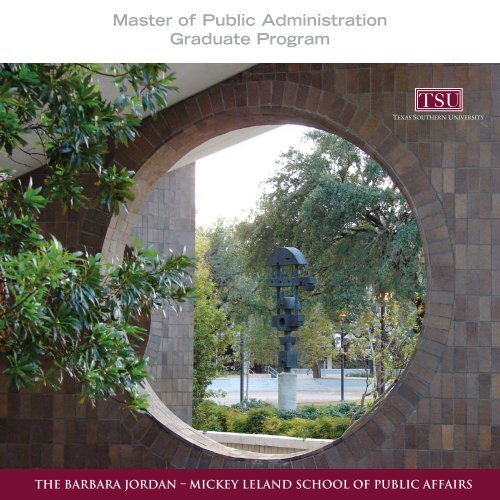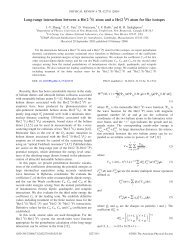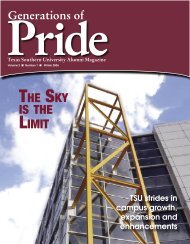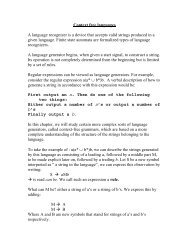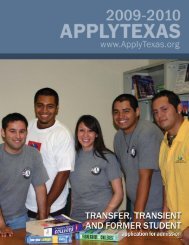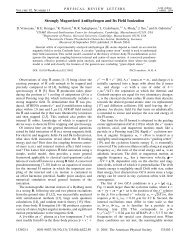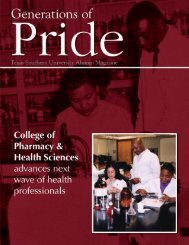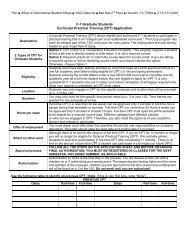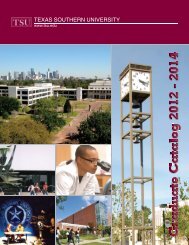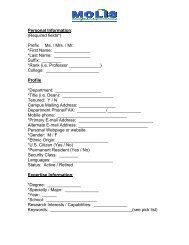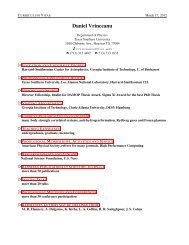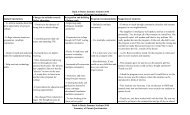Master of Public Administration Graduate Program - TSU MPA
Master of Public Administration Graduate Program - TSU MPA
Master of Public Administration Graduate Program - TSU MPA
- No tags were found...
Create successful ePaper yourself
Turn your PDF publications into a flip-book with our unique Google optimized e-Paper software.
<strong>Master</strong> <strong>of</strong> <strong>Public</strong> <strong>Administration</strong><strong>Graduate</strong> <strong>Program</strong>The Barbara Jordan – Mickey Leland School <strong>of</strong> <strong>Public</strong> Affairs
“My experience at the Barbara Jordan – Mickey Leland School<strong>of</strong> <strong>Public</strong> Affairs has opened up my views and perspectives <strong>of</strong>how to be an effective leader while providing me with the toolsthat will set me apart as a public administrator.”Kendrack Lewis — <strong>MPA</strong> Candidate“The <strong>MPA</strong> faculty is knowledgeable and experienced in theirareas <strong>of</strong> concentration. They <strong>of</strong>fer a unique opportunity totheir students; helping to establish a strong foundation forthe graduates to move as leaders in the community.”Natia Simon — <strong>MPA</strong> Candidate“The idea <strong>of</strong> studying at an institution named after two greatpublic servants; Barbara Jordan and Mickey Leland, providesme with the incentive to make my mark and make a significantdifference as I pursue a career in public service.”Mickey Ary — <strong>MPA</strong> Candidate“In this age <strong>of</strong> globalization, the <strong>MPA</strong> program <strong>of</strong>fers acomprehensive curriculum designed to develop the neededskills and applications which are vital components to beinga public manager. Students are strongly encouraged toparticipate in civic engagement and public service.”Linda Smith — <strong>MPA</strong> Candidate“The School <strong>of</strong> <strong>Public</strong> Affairs has prepared me to be anefficient public administrator. Its supportive environmenthas enabled me to hone skills that are transferable into thepublic sector environment. These skills will be useful asI prepare for the “new public sector” – opportunities ingovernment, non-pr<strong>of</strong>its, NGOs, consulting and education.”Landon Taylor — <strong>MPA</strong> Candidate
<strong>Program</strong> Outline / <strong>Program</strong> MissionThe <strong>Master</strong> <strong>of</strong> <strong>Public</strong> <strong>Administration</strong> (<strong>MPA</strong>) <strong>Program</strong> has as its purpose the preparation <strong>of</strong>pr<strong>of</strong>essionals for immediate upward mobility in pr<strong>of</strong>essional careers in public sectors or forgraduate study where the nature <strong>of</strong> the pr<strong>of</strong>ession requires the master’s degree as the entrycriterion. Its greatest single asset lies in its potential to alleviate the shortage <strong>of</strong> pr<strong>of</strong>essionallyeducated persons, especially those from minority groups, in local, state, national and internationalpublic service.The program is designed to prepare pr<strong>of</strong>essionals to resolve the increasingly complex problems<strong>of</strong> managing urban growth. It is intended to respond to the increasing importance <strong>of</strong> planningand management as major instruments in improving and developing solutions to problems <strong>of</strong>cities and metropolitan regions. The program seeks to give students a balanced inventory <strong>of</strong>conceptual, quantitative and pr<strong>of</strong>essional skills.<strong>Program</strong>’s Curricular Objectives:1. Educate students on analytical approaches to decision-making in the managerialsciences.2. Provide students with problem solving skills and analytical competencies that arerelevant to management positions.3. Emphasize knowledge <strong>of</strong> the workings <strong>of</strong> governmental and non-governmentalorganizations.4. Develop the student’s ability to make use <strong>of</strong> academic research.5. Provide a foundation in computer and information technology.6. Sharpen written and oral communication skills.7. Emphasize knowledge <strong>of</strong> basic management processes and techniques.<strong>Program</strong> DetailsDegree Requirements1. Eight Core Courses – 24 hours2. Four Specialization Courses – 12 hours3. Internship – 6 hoursAreas <strong>of</strong> Specialization1. <strong>Public</strong> Policy2. Human Resources3. International and Development <strong>Administration</strong>
<strong>Master</strong> <strong>of</strong> <strong>Public</strong> <strong>Administration</strong> – CurriculumCore Courses (24 hours)PAD 500 <strong>Public</strong> <strong>Administration</strong> Theories and PracticePAD 502 Research Methods in <strong>Public</strong> <strong>Administration</strong>PAD 503 Quantitative Methods IPAD 504 Quantitative Methods IIPAD 507 Seminars in Organizational TheoryPAD 509 Computer Applications in <strong>Public</strong> <strong>Administration</strong>PAD 631 Government Budgeting and Financial ManagementPAD 640 <strong>Public</strong> Personnel <strong>Administration</strong>: Theory and PracticeSpecialization Courses (12 Hours)Students must take 12 hours <strong>of</strong> coursework in one <strong>of</strong> thefollowing specialization areas: public policy, human resources,or international and development administration.<strong>Public</strong> PolicyPAD 620 Policy Making ProcessPAD 621 Social Researches and Social PolicyPAD 622 Science, Technology and <strong>Public</strong> PolicyPAD 623 <strong>Public</strong> Policy Analytical MethodsPAD 624 Issues on AgingHuman ResourcesPAD 641 Human Resources and Organizational PlanningPAD 642 Labor Relations and Collective BargainingPAD 705 Topical SeminarInternational and Developmental <strong>Administration</strong>PAD 660 Introductions to International DevelopmentPAD 661 Selected Topics in Comparative International DevelopmentPAD 662 Comparative <strong>Public</strong> <strong>Administration</strong> Developing NationsPAD 663 Seminars on Developing Societies
Course DescriptionsPAD 500 – <strong>Public</strong> <strong>Administration</strong> Theory and Practice (3 Credits)A general survey <strong>of</strong> public sector management and administration. This class addresses administrative theory,policy, decision-making, and the concepts and practices <strong>of</strong> organizational management.PAD 501 – Administrative Decision Making (3 Credits)The techniques <strong>of</strong> decision analysis and methodology for making decisions are discussed. There is a focus on therisk and uncertainty <strong>of</strong> choice among policy alternatives.PAD 502 – Research Methods in <strong>Public</strong> <strong>Administration</strong> (3 Credits)Examines the concepts and methods employed in administrative research and analysis with an emphasis onmethodological assumptions. The problems and issues in research design are also analyzed.PAD 503 – Quantitative Methods I (3 Credits)A modeling course that introduces classical deterministic optimization models. Topics include linearprogramming, probabilistic and statistical models.PAD 504 – Quantitative Methods II (3 Credits)An applied course in regression analysis, hypothesis testing, estimation and time series analysis. Strong emphasiswill be on forecasting techniques. Mini-taps, SAS and SPSS will be utilized.Prerequisite: PAD 503PAD 506 – <strong>Program</strong> Evaluation (3 Credits)An analysis <strong>of</strong> alternative designs for evaluating the performance <strong>of</strong> programs. There is an emphasis on designingan evaluation study through application principles and problems encountered in evaluation research.Prerequisites: PAD 502, 503PAD 507 – Seminar in Organizational Theory (3 Credits)An exploration <strong>of</strong> the various relationships between organization and management in both the public and privatesphere. The live-case method will be used.PAD 508 – <strong>Administration</strong> Regulations (3 Credits)Focuses on legal context and the statutory, regulatory and adjudicative functions <strong>of</strong> public agencies. Reviewsinterpretations <strong>of</strong> administrative orders, rules, regulations, contracts and documents.PAD 509 – Computer Applications in <strong>Public</strong> <strong>Administration</strong> (3 Credits)Focuses on current practices for gathering data and analysis with the use <strong>of</strong> computers.
PAD 620 – The Policy Making Process (3 Credits)An examination <strong>of</strong> the process by which policy is formulated and implemented. This classemphasizes the relationships between the political process and policy outcomes in illustrativepolicy areas.PAD 621 – Social Research and Social Policy (3 Credits)Discusses the implications <strong>of</strong> social science research for social policy. Experimental and researchdesigns will be useful for deciding which program features to examine systematically.Prerequisites: PAD 502, 503PAD 622 – Science, Technology and <strong>Public</strong> Policy (3 Credits)An examination <strong>of</strong> the impact <strong>of</strong> science and technology on governmental policy in theUnited States.PAD 623 – <strong>Public</strong> Policy Analytical Methods (3 Credits)Looks at the application <strong>of</strong> theories and techniques <strong>of</strong> policy analysis to current public problems.There is a focus on design and execution <strong>of</strong> policy research.PAD 624 – Issues on Aging (3 Credits)Addresses issues such as employment, health care, housing, income security, social services, socialsecurity and Medicare programs.PAD 630 – <strong>Public</strong> Financial Management (3 Credits)An introduction to capital budgeting, financial decision-making and valuation. Discusses sources<strong>of</strong> finance and financing problems associated with public projects.PAD 631 – Government Budgeting and Financial Management (3 Credits)Examines the design and use <strong>of</strong> planning, budgeting and other information systems in the controland evaluation <strong>of</strong> programs. Multi-project valuation techniques will be emphasized.PAD 633 – Managerial Finance: Analytical Methods (3 Credits)The study <strong>of</strong> decision-making models involving the major components <strong>of</strong> financial management.An emphasis is on the application <strong>of</strong> analytical methods to portfolio management.PAD 640 – <strong>Public</strong> Personnel <strong>Administration</strong> (3 Credits)Examines the fundamentals <strong>of</strong> personnel employment and placement, staff and evaluation, wageand salary administration, employment benefits and services, and labor relations.PAD 641 – Human Resources and Organizational Planning (3 Credits)Involves the critical analysis <strong>of</strong> personnel and organizational structure and function. Emphasizesresearch, planning, staffing and budget preparation.
Admissions RequirementsAll students must meet the admission requirements <strong>of</strong> the Texas Southern University<strong>Graduate</strong> School and the Barbara Jordan – Mickey Leland School <strong>of</strong> <strong>Public</strong> Affairs -<strong>Public</strong> <strong>Administration</strong> Department.For more information, visit:http://www.tsu.edu/academics/graduate/admission/index.aspAll Applicants should submit the following:1. The Texas Southern University <strong>Graduate</strong> School Application (specific program)and a non-refundable application fee2. Two <strong>of</strong>ficial copies <strong>of</strong> transcripts from all colleges and/or universities attended3. GRE Scores (minimal <strong>of</strong> at least a 3.5 score on the Analytical Writing Section)4. Three letters <strong>of</strong> reference from individuals qualified to give an evaluation <strong>of</strong>the applicants past scholastic performance, research, ability for advanced workin administration <strong>of</strong> justice, and personal motivation5. Essay: 250 – 300 words6. Documentation <strong>of</strong> completion <strong>of</strong> all undergraduate prerequisite courses inresearch methods and statistics.All students who have not completed the prerequisite courses for the <strong>MPA</strong> may beconditionally admitted. Students are required to complete prerequisite courses in theBarbara Jordan – Mickey Leland School <strong>of</strong> <strong>Public</strong> Affairs and must earn a grade <strong>of</strong>“B” or better.Funding opportunities are available.
Dual <strong>MPA</strong> / JD <strong>Program</strong>The Barbara Jordan – Mickey Leland School <strong>of</strong> <strong>Public</strong> Affairs <strong>of</strong>fers a Dual<strong>MPA</strong> / Juris Doctorate (JD) Degree in coordination and partnership withthe Thurgood Marshall School <strong>of</strong> Law at Texas Southern University. Theprogram allows students to complete requirements for the two degrees in four(4) years instead <strong>of</strong> 5 years, if pursued separately. The program is intended forstudents who want to obtain mastery <strong>of</strong> the administrative and legal aspects <strong>of</strong>public administration in the public, private and non-pr<strong>of</strong>it sectors; combiningadvanced public administration education with legal training in order toenhance or expand their career options.• The <strong>MPA</strong> / JD Dual Degree <strong>Program</strong> is opento holders <strong>of</strong> baccalaureate degrees from accreditedcolleges or universities.• Applicants to the program must meet the entrancerequirements and follow the application proceduresadministered by the Texas Southern University<strong>Graduate</strong> School (www.tsu.edu/academics/public),the Barbara Jordan – Mickey Leland School <strong>of</strong> <strong>Public</strong>Affairs <strong>MPA</strong> <strong>Program</strong> and the Thurgood MarshallSchool <strong>of</strong> Law (www.tsu.edu/academics/law).• Dual Degree <strong>Program</strong> participants will have tosatisfy the same admission requirements as applicantsfor the stand-alone <strong>Master</strong> <strong>of</strong> <strong>Public</strong> <strong>Administration</strong>(<strong>MPA</strong>) and Juris Doctorate (JD) programs.• Admission to the Dual Degree <strong>Program</strong> shallbe open to all <strong>MPA</strong> and law students who areacademically eligible under the <strong>TSU</strong> <strong>Graduate</strong> School,<strong>MPA</strong> <strong>Program</strong> and Thurgood Marshall School <strong>of</strong>Law Rules.• <strong>MPA</strong> students wishing to enroll in the DualDegree <strong>Program</strong> must petition the <strong>MPA</strong> <strong>Program</strong>Director. Such petition shall state why the studentwishes to enroll in the program and include a proposedplan for completing all course work and otherrequirements within four (4) years. Students who havenot submitted this petition will not be considered DualDegree candidates.• Although students may apply for either the <strong>MPA</strong>or JD program at any time during their course <strong>of</strong> study,students must be admitted to both programs beforecompleting either program.• Continuation in the Dual Degree <strong>Program</strong> shallbe dependent upon the student’s satisfactory academicprogress in each <strong>of</strong> the dual fields. Incomplete work orother evidence <strong>of</strong> unsatisfactory academic progress maylead to a decision by the <strong>MPA</strong> <strong>Program</strong> Director toreduce the student’s workload directed towards the lawdegree. Continued unsatisfactory progress may resultin dismissal from the Dual Degree <strong>Program</strong>.
Michael O. Adams, Ph.D.<strong>Program</strong> Director / Pr<strong>of</strong>essor – <strong>Public</strong> <strong>Administration</strong>Atlanta University – Political ScienceAreas <strong>of</strong> Interest: E-Government, Web 2.0, <strong>Public</strong> Policy, and Policy AnalysisEugene Barrington, Ph.D.Associate Pr<strong>of</strong>essor – <strong>Public</strong> <strong>Administration</strong>Syracuse University – Political ScienceAreas <strong>of</strong> Interest: Human Resource <strong>Administration</strong>, Labor Relations,Ethics Practice and Theory, and Organizational Structure and DesignTheophilus Herrington, Ph.D.Dean – Barbara Jordan – Mickey Leland School <strong>of</strong> <strong>Public</strong> Affairs / Associate Pr<strong>of</strong>essorUniversity <strong>of</strong> Illinois – Political ScienceAreas <strong>of</strong> Interest: Urban Management, <strong>Public</strong> Policy Management, and American Political InstitutionsZuberi Mwamba, Ph.D.Pr<strong>of</strong>essor – <strong>Public</strong> <strong>Administration</strong>Howard University – Political ScienceAreas <strong>of</strong> Interest: <strong>Public</strong> <strong>Administration</strong> in DevelopingNations, African Politics, Comparative Governments, and International RelationsCarroll G. Robinson, Esq.Associate Pr<strong>of</strong>essor – <strong>Public</strong> <strong>Administration</strong>George Washington University – Juris DoctorateAreas <strong>of</strong> Interest: Law and Policy, Economics and Policy,Climate Change Policy and Metropolitan Sustainability, and Policy and PoliticsDon Anthony Woods, Ph.D.Pr<strong>of</strong>essor – <strong>Public</strong> <strong>Administration</strong>University <strong>of</strong> Pittsburgh – <strong>Public</strong> <strong>Administration</strong>Areas <strong>of</strong> Interest: International Development andComparative <strong>Public</strong> <strong>Administration</strong>s
Contact InformationAdmission to the graduate program for <strong>Master</strong> <strong>of</strong> <strong>Public</strong> <strong>Administration</strong> is competitive. Applicantsmust demonstrate an ability to participate fully, engage in, and successfully complete the program.The Barbara Jordan – Mickey Leland School <strong>of</strong> <strong>Public</strong> Affairs - <strong>Public</strong> <strong>Administration</strong> Department seeksindividuals with a desire to resolve the complex problems <strong>of</strong> managing urban growth in metropolitan areas.For More Information or To ApplyVisit – www.tsu.edu/academics/graduateor contactMichael O. Adams, Ph.D.<strong>Program</strong> Director(713) 313-7760adams_mo@tsu.edu<strong>Master</strong> <strong>of</strong> <strong>Public</strong> <strong>Administration</strong> Department(713) 313-7760Texas Southern University – The <strong>Graduate</strong> School(713) 313-4410The Barbara Jordan – Mickey Leland School <strong>of</strong> <strong>Public</strong> Affairs<strong>Master</strong> <strong>of</strong> <strong>Public</strong> <strong>Administration</strong> <strong>Graduate</strong> <strong>Program</strong>Texas Southern University3100 Cleburne StreetHouston, Texas 77004Photography by Earlie Hudnall and J. Sebastien Boncy. Cover photo <strong>of</strong> the distinctive work entitled“Jonah and the Whale” – Carroll Harris Sims Sculpture Plaza – Texas Southern University.


